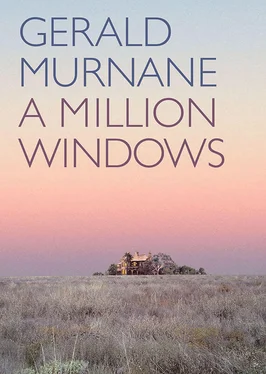As for the so-called theoretical reason mentioned above, many a one of us, having opened by chance some or another work of fiction, turns away from the sight of quotation marks looking like swarms of flies or a series of dashes like rungs on a ladder to nowhere — he turns away because dialogue, so to call it, is of all the tricks and devices used by writers of fiction that which most readily persuades the undiscerning reader that the purpose of fiction is to provide the nearest possible equivalents of experiences obtainable in this, the visible world where books are written and read. Many a young writer must often be tempted to compose a passage of dialogue rather than struggle with a report of elusive or abstruse matters. Suppose such a writer to be trying to write a fictional account of the death of a grandparent of the chief character. (Those of us who once earned a living as teachers of creative writing, so to call it, tell me that many a younger student was able to write a piece of fiction of considerable meaning about this sort of occasion, which was often the presumed author’s first experience of the death of someone close.) The young writer surely has in mind images of rooms and of furniture or of scenery out of doors; images of persons speaking and gesturing, images of scents, perhaps from a garden or from a corridor in a hospital; images of sensations such as the feel of wind against his face or of breasts encased in fabric while his mother holds him against herself. The writer wants to compose from these seeming memories such sentences as will seem to bring to the reader what he or she would call an actual experience. The writer seeks words for those sentences, but words, as he would have learned already, are not so readily available as are seeming memories and the like. But then there occurs to the writer a means of filling his pages much more rapidly than he could have filled them with sentences laboriously composed. The writer is able to recall whole sequences of words that he first heard on the occasion of his grandparent’s death. What he recalls are, in fact, not words but images of words. Images of words, however, unlike images of scenery, say, or of the feel of breasts encased in fabric seem to most persons so like the words themselves as to be hardly distinguishable. And so, the young writer, while he seems to hear, clearly and unmistakably, many a sequence of words that was once uttered in his hearing or that he himself once uttered — the young writer is able to fill space after blank space on his pages with words such as the following.
‘Why are you crying, Mother?’ I asked.
‘You’ll have to be strong, son,’ she replied. ‘Your pa has gone to heaven.’
This paragraph has been written for the benefit of any person who may have picked up this work of fiction in a bookshop or in any other surroundings and who may have opened the work at this page and who may have read immediately afterwards the previous two lines and may then have assumed that other similar lines appear on many of the surrounding pages. No other such lines appear anywhere in this work of fiction or in any of the works of fiction written in this out-of-the-way corridor of this vast building. We who have found our way to this outpost, as it might be called — we not only consider dialogue, as it is called, the crudest of the many devices used by those writers of fiction whose chief aim is to have their readers believe they are not reading a work of fiction, but we ourselves have it as our chief aim that our readers should be continually mindful that what they are reading is nothing else but fiction.
And yet…how often are we obliged to write those words after an expression of a forthright belief? Perhaps forty years ago, when I was still forming my judgements in many matters, I read of a writer whose novels, as they were called, consisted almost wholly of dialogue. I recall her name, which was Ivy Compton-Burnett, and that she was an eccentric female solitary. Did I learn also that she lived alone in a house of two, or perhaps three, storeys in the English countryside? Or, am I too much influenced by what I have in mind while I write these pages? Certainly, I read one of her works of fiction, which consisted, sure enough, of dialogue and little else. Not surprisingly, I have forgotten almost everything that I experienced while I read the work. I have not forgotten, however, a mental image of a large house of stone, almost as imposing as the wing where I sit writing these words. The house is occupied by an uncertain number of personages, many of whom seem to be siblings or near-relations and unmarried. These personages seem to meet up with one another at unpredictable times and to discuss, among other matters, difficulties between themselves and their parents. At other times, they seem to wander through the house of stone, talking at length but often as though to themselves. One such personage is named Horace. He is the only personage whose name I recall. He may also be the only personage who seemed, while I read, to be more than a mere utterer of dialogue, so to call it. Horace is reported in the text as having spoken the only words that I recall from the whole book of fiction. He speaks the words, as I recall, on one of the occasions when a number of personages are reported as trying to explain to one another why they are obliged to live under such harsh conditions. One of them is reported as saying something such as ‘Oh, well, a man’s a man.’ Horace is then reported as saying something such as ‘That is not so. I am not.’

One of those two who formerly taught writing in universities once made what he calls a detailed study of the subject-matter of all the pieces of fiction that had earned from him, during the previous two years, the grade of High Distinction. He had already observed, before he began his study, that almost every piece of fiction that impressed him, regardless of the manner of its narration, included what he chose to call a chief character and a lesser character and that the interest of the fiction arose out of the dealings between these two. When he began his study, the teacher had not yet decided how to classify the many sorts of chief character and lesser character that he was likely to find. He supposed that he might classify the characters first according to their gender and then according to their relatedness with one another, as, for example, wife and husband, mother and son, friend and friend, and the like. He was only a little way into his study when he decided that all such relationships were divisible into two groups only: relationships determined by blood and those otherwise determined. He then set about separating the pieces of fiction under study according to this division. The results surprised him somewhat. He had expected that a majority of the pieces would have included characters from the second of the two groups, but the opposite was the result. In nearly two thirds of the pieces of fiction that had impressed him during the two years past, the most prominent characters were blood-relations. It then occurred to him that he could further divide these pairs of characters into two groups. In one group were those pairs whose relationship might be called vertical, as, for example, parents and children, while the other group comprised those related horizontally, as, for example, siblings or cousins. Again, one group outnumbered the other, this time even more so: in about four fifths of the pieces, the relationship between the chief characters was the so-called vertical.
I heard about this study long ago, and I recalled it recently when I was conducting what might be called a simple study of my own. Some of us, of course, can never be induced, even during long drinking-sessions, to reveal any detail of their latest fictional projects, their works-in-hand. Others talk freely about their writerly tasks, even if only, as some of them claim, so that their talking will rid them of what was fit only for gossip and will leave them with the deep, stubborn matter needed for giving shape to sentences and paragraphs. The reported subject-matter of two such projects deserves to be included in this, my own latest work. Of course, I have seen not a single page of either project, but I am so used to assembling texts-in-the-mind from scant impressions that the following paragraphs may seem as though I lately read the originals or even wrote them.
Читать дальше










